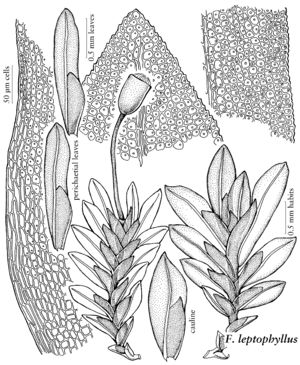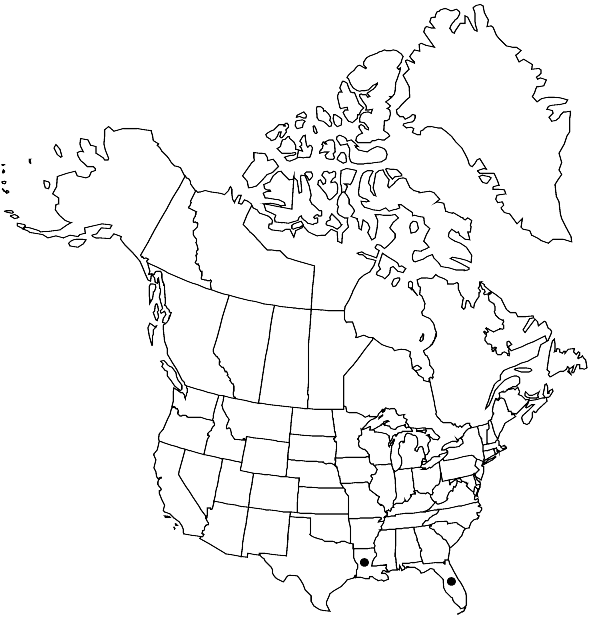Difference between revisions of "Fissidens leptophyllus"
Ann. Sci. Nat., Bot., sér. 2, 14: 344. 1840,.
FNA>Volume Importer |
imported>Volume Importer |
||
| (6 intermediate revisions by 2 users not shown) | |||
| Line 10: | Line 10: | ||
|name=Fissidens reesei | |name=Fissidens reesei | ||
|authority=H. A. Crum & L. E. Anderson | |authority=H. A. Crum & L. E. Anderson | ||
| + | |rank=species | ||
}} | }} | ||
|hierarchy=Fissidentaceae;Fissidens;Fissidens leptophyllus | |hierarchy=Fissidentaceae;Fissidens;Fissidens leptophyllus | ||
| Line 23: | Line 24: | ||
|habitat=Around bases of trees, decaying wood, infrequently on soil, cypress-gum swamps | |habitat=Around bases of trees, decaying wood, infrequently on soil, cypress-gum swamps | ||
|distribution=Fla.;La. | |distribution=Fla.;La. | ||
| − | |discussion=<p>The extent of the limbidium is the best way to distinguish Fissidens leptophyllus from F. submarginatus. The limbidium in F. leptophyllus is confined to the proximal 1/2 or less of the vaginant laminae of most leaves, but in F. submarginatus the limbidium extends the entire length of the vaginant laminae and sometimes onto the proximal part of the adjacent ventral lamina of most or all leaves.</p> | + | |discussion=<p>The extent of the limbidium is the best way to distinguish <i>Fissidens leptophyllus</i> from <i>F. submarginatus</i>. The limbidium in <i>F. leptophyllus</i> is confined to the proximal 1/2 or less of the vaginant laminae of most leaves, but in <i>F. submarginatus</i> the limbidium extends the entire length of the vaginant laminae and sometimes onto the proximal part of the adjacent ventral lamina of most or all leaves.</p> |
|tables= | |tables= | ||
|references= | |references= | ||
| Line 32: | Line 33: | ||
-->{{#Taxon: | -->{{#Taxon: | ||
name=Fissidens leptophyllus | name=Fissidens leptophyllus | ||
| − | |||
|authority=Montagne | |authority=Montagne | ||
|rank=species | |rank=species | ||
| Line 45: | Line 45: | ||
|publication year= | |publication year= | ||
|special status= | |special status= | ||
| − | |source xml=https:// | + | |source xml=https://bitbucket.org/aafc-mbb/fna-data-curation/src/2e0870ddd59836b60bcf96646a41e87ea5a5943a/coarse_grained_fna_xml/V27/V27_492.xml |
|genus=Fissidens | |genus=Fissidens | ||
|species=Fissidens leptophyllus | |species=Fissidens leptophyllus | ||
Latest revision as of 21:26, 5 November 2020
Plants to 7 × 2.5 mm. Stem unbranched and branched; axillary hyaline nodules absent; central strand absent. Leaves as many as 12 pairs, oblong to lingulate, broadly acute to obtuse, sometimes apiculate, to 1.4 × 0.5 mm; dorsal lamina narrowed proximally, ending at insertion, not decurrent; vaginant laminae ± 1/2 leaf length, ± unequal, minor lamina ending near margin; margin crenulate-serrulate but limbate and entire on proximal 1/3–1/2 of vaginant laminae of most leaves, limbidial cells 1-stratose; costa ending 2–6 cells before apex, bryoides-type; lamina cells 1-stratose, distinct, mammillose, firm-walled, irregularly hexagonal, 7–12 µm, smooth, larger, ± oblong, pellucid juxtacostally in proximal parts of vaginant laminae. Sexual condition gonioautoicous. Sporophytes 1 per perichaetium. Seta to 2 mm. Capsule theca exserted, erect, radially symmetric, 0.5 mm; peristome scariosus-type; operculum 0.4 mm. Calyptra cucullate, smooth, 0.3–0.5 mm. Spores 10–16 µm.
Habitat: Around bases of trees, decaying wood, infrequently on soil, cypress-gum swamps
Discussion
The extent of the limbidium is the best way to distinguish Fissidens leptophyllus from F. submarginatus. The limbidium in F. leptophyllus is confined to the proximal 1/2 or less of the vaginant laminae of most leaves, but in F. submarginatus the limbidium extends the entire length of the vaginant laminae and sometimes onto the proximal part of the adjacent ventral lamina of most or all leaves.
Selected References
None.

